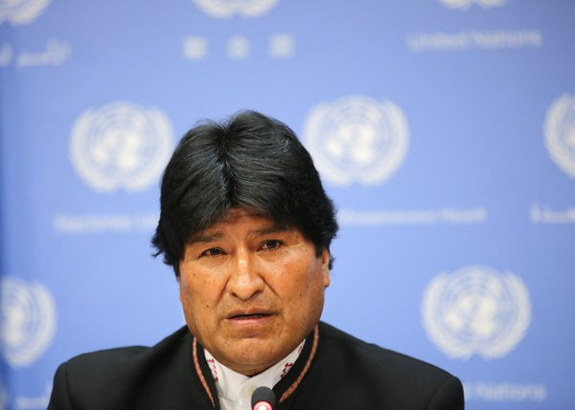
(above) Bolivia's president, Evo Morales, in April after a special United Nations session on world drug problems. Jemal Countess / Getty Images
How Bolivia Fights the Drug Scourge
September 14, 2016 - NY Times
By THE EDITORIAL BOARD
September 14, 2016
This week, the White House issued its yearly report on the nations on the front lines of the war on drugs. Predictably, it listed Bolivia as one of three countries that "failed demonstrably" to do enough to combat the drug trade. President Evo Morales of Bolivia responded, as he does each year, with defiance.
"The world knows that our counternarcotics model is better without the Americans," Mr. Morales said during an event on Tuesday, alluding to his expulsion of American drug enforcement agents in 2008.
The yearly condemnation of Bolivia has been futile. So far, that country's experience with its drug strategy is showing more promise than Washington's forced-eradication model.
Over the past decade, the Bolivian government has sought to gradually curb the cultivation of coca — the plant processed to make cocaine — by establishing a tightly regulated market for its consumption as a nonnarcotic stimulant. (Bolivians have been chewing coca leaf and using it to make tea for generations.) The government eradicates unauthorized crops after negotiating with, and finding alternatives for, growers.
This approach, which has been supported and financed by the European Union, has shown significant results. According to the United Nations Office on Drugs and Crime, coca leaf cultivation in Bolivia has declined each of the past five years. In its latest report, U.N.O.D.C. said Bolivia had roughly 20,200 hectares (about 78 square miles) of coca cultivation, a slight drop compared with the previous year.
These tactics have been hailed by scholars and some Western officials because they place a premium on the rights and needs of farmers in poor areas. Coca growers who have voluntarily registered with the government are given title for small parcels of land and are authorized to grow a limited amount. Mr. Morales, a former coca growers union leader, has played a hands-on role in negotiating the terms of this arrangement with unions and other local leaders.
This stands in stark contrast to the strategy the United States has long financed in the region — a combination of aerial herbicide spraying, manual eradication and the prosecution of drug kingpins in the United States. The inadequacy of this approach is most obvious in Colombia, which has been Washington's closest ally in Latin America on counternarcotics.
Last year, coca cultivation in Colombia increased by nearly 40 percent compared with the previous year, according to U.N.O.D.C. The tough-on-crime approach has often exacerbated violence there. Colombia, however, did not get the "failed demonstrably" label. It may be time for Washington to drop that marker altogether and study the merits of innovative approaches, including Bolivia's.